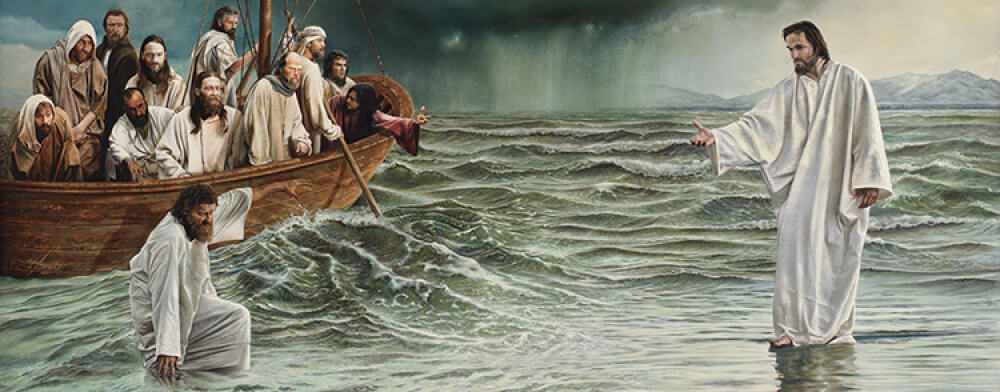You may sometimes receive a question you wish to answer but are not sure about. Your answer would then start with “I believe” or “I guess” or “I suppose” or “I think”. When I would give such answers as a teenager, those around me would often say “believing is something we do in church”, meaning that if you are not certain, your answers are not very helpful. Their degree of doubt has probably encouraged me to question many things and to emphasize facts.
But it is of course not true that something you “only” believe does not matter.
First of all everyone’s opinion matters because it is his or her opinion. Secondly, there are a great many situations when we cannot be absolutely sure about something, but we still need to act. For instance, if we need water from the tap, we are not constantly worried that the tap won’t work. Here in the West it rarely happens that there is no water, so we can have faith in our water supply. Is it absolutely sure we will always have enough pure water? No, but our faith protects us from living in a constant state of fear. Remember this: True faith is never based on fear, but overcomes fear.
Thirdly, faith is a powerful agent of transformation as well as an instrument of peace.
The Oxford dictionary defines faith as “Complete trust or confidence in someone or something” or “Strong belief in the doctrines of a religion, based on spiritual conviction rather than proof”. And as Prof. Peter-Ben Smit told us in his sermon 2 weeks ago, the Greek words for faith and trust are the same, namely ‘pistis’. So what Christians do in church and as part of their lifestyle is not so different from what all people do as part of their daily life. We trust in a number of things, like people, ideas and influences, most of which we only understand for a very small part.
On the 6th of July Nurri Vittachi wrote an article on the Science 2.0 website saying that “Cognitive scientists are becoming increasingly aware that a metaphysical outlook may be so deeply ingrained in human thought processes that it cannot be expunged”. He goes on, “evidence from several disciplines indicates that what you actually believe is not a decision you make for yourself. Your fundamental beliefs are decided by much deeper levels of consciousness, and some may well be more or less set in stone”. Graham Lawton, an avowed atheist himself, wrote in the New Scientist about studies that showed “for example, that even people who claim to be committed atheists tacitly hold religious beliefs, such as the existence of an immortal soul.” This shouldn’t come as a surprise, since we are born believers, not atheists, scientists say. Humans are pattern-seekers from birth, with a belief in karma, or cosmic justice, as our default setting. “A slew of cognitive traits predisposes us to faith,” writes Pascal Boyer in Nature, the science journal, adding that people “are only aware of some of their religious ideas”.
Peter-Ben Smit linked our trust in God to our basic trust in life in general. He mentioned two kinds of trustworthiness, two kinds of reality we can believe in. We can have trust in a world where everyone has to fight for himself, so we can and should do the same, and this will give us a degree of peace and acceptance. Or we can trust in a reality that contains hope for even the outcasts and the poor. As Christians we can be certain in this hope, because God raised and exalted Jesus, who had been rejected and crucified by those in power, with the agreement of most of his own people. If God could do this for Jesus, he can do it for us as well. This means that money and deceit and cruelty do not have to have the last word.
The story of Peter
Now let us turn to the story of Jesus and Peter on the stormy lake. It is found in all 3 synoptic gospels, and must be distinguished from the story of Jesus calming the storm, which is only found in the gospel of Mark. In Mt. 14 we find Peter and the other disciples being afraid of what they think is a ghost hovering above the waves. This is sometimes the effect when we encounter something or someone that challenges us. We tend to fear victory over chaos and unrest more than the chaos and unrest itself. Instead we close our eyes or listen to politicians who tell us that everything is under control. Or worse, we believe that blending in and acting on our fears is our best chance for survival.
Large masses put their trust in those who only pretend to care, but in reality help themselves and the already rich to make more money. We do this, because the alternative seems even scarier.
The New Living Translation of Psalm 146:3 reads, “Don’t put your confidence in powerful people; there is no help for you there.” But that is such a strange concept, especially in this time in which selling ourselves to the highest bidder has become so normal. Therefore we need the divine alternative to reveal itself to us, or we would never opt for it. Now that is exactly what Jesus did. He said “Take heart, it is I; do not be afraid”. It is the core message of our reading and belongs to that part which occurs in all three synoptic gospels. Yet the rest of the story is also interesting.
You see, the self-revelation of Christ also solves the difficulty we would otherwise have with consciously choosing what to believe. It is much easier to believe when Jesus appeals to a faith that is already there, deep within us. And, again, that is exactly what Jesus does, in the case of Peter. This personal touch makes it easier for us to imagine what Jesus can do for each of us as well.
We know that we are capable of great things, but we don’t always know how.
Like Peter, we are looking for a guide, for a model, someone with authority who assures us we can rise above the fear of destruction that normally keeps us imprisoned within the ordinary and within sinfulness, which is another word for failure. And here I don’t mean failure in the sense of a low income, but failure in the sense of lack of compassion, self-respect and vision for mankind.
When Jesus helped Peter to walk on the water, it helped him in two ways.
It improved Peter’s confidence and quality of life, but also proved that Jesus was who He said He was. So Peter called for Jesus to command him to walk on the waters of chaos, and Jesus commanded him, and he walked. Now this is something we can do as well, that is, ask our Lord to challenge us to discover new dimensions of our humanity, proving along the way that He is a powerful friend. Ask him for courage in the face of those who wish to keep us ignorant, moulding us into predictable, selfish consumers with no aspirations for a better world, and hating who they want us to hate. Ask him to make us ambassadors of the Kingdom of heaven, being in the world but not of this world. Sometimes we seek some sort of permission to do and/or believe that which will set us free. Well, here we have that permission!
Like Jesus we can become light, so that we still notice the storm, but are not so much affected by it. And this is particularly important in our time as well, with all its chaos, decay and deceit. In the other story, which is only found in Mark, chapter 4, Jesus commands the waters to be silent. That story is probably more well-known. But Matthew reminds us that it is a far greater challenge to have peace in the midst of a storm than to have Jesus take the storm away for you. In this story the storm does end more naturally, without Jesus overruling the forces of nature. The storm ceased when Peter and Jesus stepped on board, when it had served its purpose.
But how about Peter sinking back into the water?
According to the story it was because he noticed the strong wind and became frightened.
So had he not noticed the strong wind before? Well, like the other disciples he had been more frightened by the ghost who turned out to be Jesus, than by the waters. Our attention always seems to go to that which causes us the most fear. And when one fear is gone, the next is invited. Even though you have just witnessed a miracle in which you yourself played an important part. Peter panicked and Jesus had to pull him out of the water. Jesus knows we cannot save ourselves. So he does not just lecture us, standing by the side. He is there when we fail, even if it is because we haven’t been paying attention before.
But then he asked the really important question. Why did you doubt?
That’s right! Peter was already walking on the water. He must have noticed something of the storm. The question is why one form of fear is so easily replaced by another.
It is almost as if we want to be pulled down. Or the moment we are successful we become proud. Both things make us an easy target for leaders who want us to go to war, or to support aggression. Fear enabled Hitler to have power over millions, fear of weapons of mass destruction led to the previous war in Irak. Fear of the Romans led to the crucifixion of Jesus. Now it is fear of the Arabs and the Russians, for which we are even prepared to sacrifice economies, including our own. Pride on the other hand, causes us not to want to lose what we have “mastered”, but to lose contact with the source of our strength, so that we lose it anyway.
Jesus asks us a simple question: Why do you doubt that you can stand above the chaos in the world? You can! You should not ignore the issues, and you should not forget to have compassion. But do not let these things drag you down, for that will help no one.
And even if our faith is weak or misdirected, Jesus will be there to help us when we call on Him. He is not only the One through whom the world was created, but also the One to save His world. Therefore we can rejoice in the midst of sadness and encourage all who struggle and suffer. Therefore in every meeting we can and should say to each other: Lift up your hearts!
Amen.
This post is also available in: Dutch





Leave A Comment